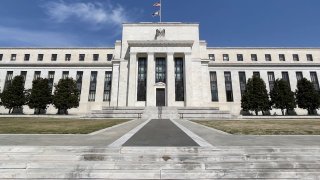
- Economic growth increased at a "moderate pace" from early April to late May, the central bank said in its periodic "Beige Book" survey of activity across its 12 districts.
- Companies said increasing vaccination rates, as well as easing of restrictions put in place to combat the Covid-19 pandemic, also helped with growth.
- However, they also cited accelerating inflation pressures coming from wages as well as the costs to procure input goods they need to operate.
Businesses are facing rising costs particularly on goods used to make their products, while they are offering higher wages and other incentives to get employees back to work, the Federal Reserve reported Wednesday.
Economic growth increased at a "moderate pace" from early April to late May, the central bank said in its periodic "Beige Book" survey of activity across its 12 districts.
Get Southern California news, weather forecasts and entertainment stories to your inbox. Sign up for NBC LA newsletters.
Companies said increasing vaccination rates, as well as easing of restrictions put in place to combat the Covid-19 pandemic, also helped with growth.
However, they also cited accelerating inflation pressures coming from wages as well as the costs to procure input goods they need to operate. Those costs, they said, will result in price increases.
"Strengthening demand … allowed some businesses, particularly manufacturers, builders, and transportation companies, to pass through much of the cost increases to their customers," the report said. "Looking forward, contacts anticipate facing cost increases and charging higher prices in coming months."
Money Report
They also cited labor shortages that are persisting even with increased incentives to get employees back. The national unemployment rate is 6.1%, and the labor market is at a crossroads of strong demand for workers but problems with supply despite 9.8 million workers on the sidelines and more than 8 million jobs available.
"Overall, wage growth was moderate, and a growing number of firms offered signing bonuses and increased starting wages to attract and retain workers. Contacts expected that labor demand will remain strong, but supply constrained, in the months ahead," the Fed report said.
Fed officials have downplayed inflation fears, saying they expect the current spate of price pressures to dissipate in the months ahead. They attribute inflation running well above their 2% target to temporary supply chain disruptions and shortages as well as skewed comparisons to a year ago when government officials shut the economy down in an effort to combat the pandemic.
Inflation concerns widespread
Respondents to the Fed's most-recent survey indicate price pressures across the board.
Contacts in the New York region reported that business are raising prices to combat input price hikes, while Cleveland said supply chain issues caused costs to "escalate" while "price hikes became more widespread as firms attempted to keep up with rising costs."
Minneapolis cited "robust demand tempered by inventory shortages and rising prices." In San Francisco, "economic activity … expanded significantly" while "wages and inflation picked up further."
Despite inflation heating up, most Fed officials say they're happy with the current state of policy.
"Although continued vigilance is warranted, the inflation and employment data thus far appear to reflect a temporary misalignment of supply and demand that should fade over time as the demand surge normalizes, reopening is completed, and supply adapts to the post-pandemic new normal," Fed Governor Lael Brainard said in a speech Tuesday.
Brainard added that the Fed is "far from our goals" regarding inclusive employment gains and she thinks that "remaining steady" is the best track at this point.
Philadelphia Fed President Patrick Harker has taken a different approach, saying Wednesday that he thinks the central bank ought to at least be considering rolling back its monthly asset purchases, currently at a minimum $120 billion.
"With the economy picking up and so much fiscal support and monetary accommodation, there is some upside risk to increased inflation," he said. "At the Fed, we're planning to keep the federal funds rate low for long, but it may be time to at least think about thinking about tapering our $120 billion in monthly Treasury bond and mortgage-backed securities purchases."
The appetite for tapering thus far has been confined to regional presidents; Brainard, the other governors and Fed Chairman Jerome Powell have largely stated they are not ready to change policy yet.
Become a smarter investor with CNBC Pro.
Get stock picks, analyst calls, exclusive interviews and access to CNBC TV.
Sign up to start a free trial today.






